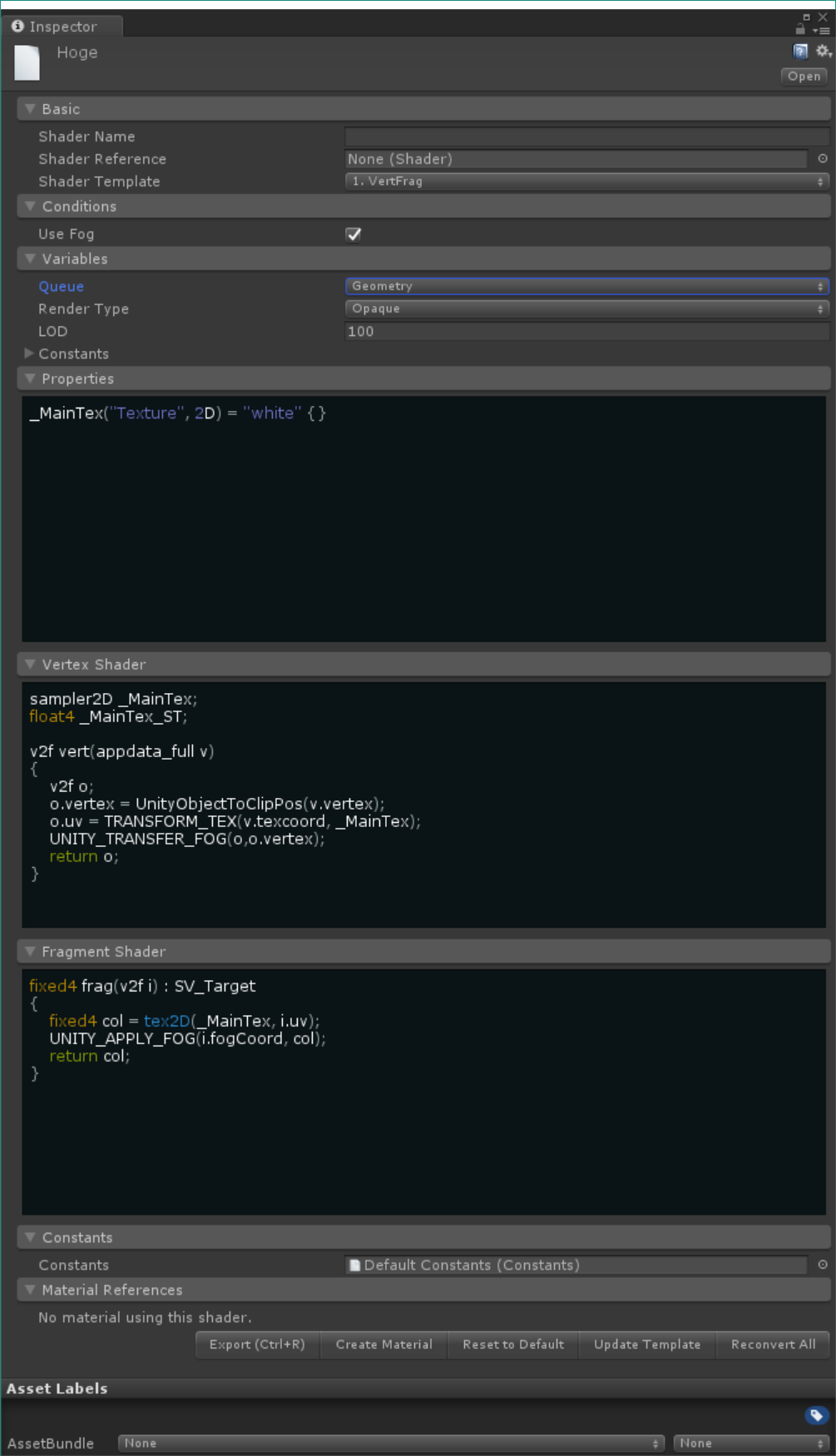Ecosyste.ms: Awesome
An open API service indexing awesome lists of open source software.
https://github.com/hecomi/ushadertemplate
This is an Unity editor extension for generating shader code from template files.
https://github.com/hecomi/ushadertemplate
editor-extension shader unity
Last synced: 10 days ago
JSON representation
This is an Unity editor extension for generating shader code from template files.
- Host: GitHub
- URL: https://github.com/hecomi/ushadertemplate
- Owner: hecomi
- License: mit
- Created: 2017-05-21T15:31:07.000Z (almost 8 years ago)
- Default Branch: master
- Last Pushed: 2021-11-14T15:11:53.000Z (over 3 years ago)
- Last Synced: 2025-02-10T03:04:50.788Z (10 days ago)
- Topics: editor-extension, shader, unity
- Language: C#
- Homepage: http://tips.hecomi.com/entry/2017/10/24/014057
- Size: 162 KB
- Stars: 149
- Watchers: 13
- Forks: 18
- Open Issues: 1
-
Metadata Files:
- Readme: README.md
- License: LICENSE.md
Awesome Lists containing this project
README
uShaderTemplate
===============
**uShaderTemplate** is an editor asset to create shaders from templates.
Install
-------
- Unity Package
- Download the latest .unitypackage from [Release page](https://github.com/hecomi/uShaderTemplate/releases).
- Git URL (UPM)
- Add `https://github.com/hecomi/uShaderTemplate.git#upm` to Package Manager.
- Scoped Registry (UPM)
- Add a scoped registry to your project.
- URL: `https://registry.npmjs.com`
- Scope: `com.hecomi`
- Install uShaderTemplate in Package Manager.
Usage
-----
1. Prepare **Shader Template** file.
2. Create **Generator** from *Create > Shader > uShaderTemplate > Generator*.
3. Input *Shader Name* and select *Shader Template* from the inspector.
4. Edit items in *Conditions*, *Variables*, and codes in code editors.
5. Press *Export (Ctrl+R)* button to create a shader from the Generator.
Overview
--------
Generator is an asset file that manages a generated shader, save parameters,
and provide an interface to customize the shader with some rules
written in **shader template**. The following image is an example of a Generator
inspector which is automatically generated from shader template.

The interface is generated from
*uShaderTemplate > Examples > Editor > Resources > ShaderTemplates > 1. VertFrag.txt*.
This is the content of this file:
**1. VertFrag.txt**
```shader
Shader "Custom/"
{
Properties
{
@block Properties
_MainTex("Texture", 2D) = "white" {}
@endblock
}
SubShader
{
Tags { "Queue"="" "RenderType"="" }
LOD
CGINCLUDE
#include "UnityCG.cginc"
struct v2f
{
float2 uv : TEXCOORD0;
@if UseFog : true
UNITY_FOG_COORDS(1)
@endif
float4 vertex : SV_POSITION;
};
@block VertexShader
sampler2D _MainTex;
float4 _MainTex_ST;
v2f vert(appdata_full v)
{
v2f o;
o.vertex = UnityObjectToClipPos(v.vertex);
o.uv = TRANSFORM_TEX(v.texcoord, _MainTex);
UNITY_TRANSFER_FOG(o,o.vertex);
return o;
}
@endblock
@block FragmentShader
fixed4 frag(v2f i) : SV_Target
{
fixed4 col = tex2D(_MainTex, i.uv);
UNITY_APPLY_FOG(i.fogCoord, col);
return col;
}
@endblock
ENDCG
Pass
{
CGPROGRAM
#pragma vertex vert
#pragma fragment frag
@if UseFog : true
#pragma multi_compile_fog
@endif
ENDCG
}
}
CustomEditor "uShaderTemplate.MaterialEditor"
}
```
You might have found some grammars like `@if foo`, ``, `@block baz`,
and these are special grammmars available in template file.
Shader variant like `#pragma multi_compile` and `#pragma shader_feature`
cannot customize the section outside `CGPROGRAM`, but with these grammar,
you can customize the all parts of the shader.
If you put template files like this in *Resources > ShaderTemplates*,
they are automatically detected and shown in the *Shader Template* field
in *Basic* section.
Grammars in Shader Template
---------------------------
```shader
// Condition:
// A toggle filed labeled "Hoge Hoge" will appear in Conditions section.
// Only when checked, the content will be output.
@if HogeHoge
#define HOGEHOGE
@endif
// You can use else block and give a default condition.
@if HogeHoge2 : false
#define HOGEHOGE2
@else
#define HOGEHOGE3
@endif
// Variable:
// The name with <> will appear in Variables section as a text field.
// You can give a default value with =, and =| will be pull-down list.
#define Hoge
#define Fuga //
#define Piyo
// Block:
// The content will be a code editor.
// Output shader has block like // @block ~ // @endblock and
// if you edit the content directly with your own editor like Vim,
// the result will be applied to the code editor in inspector.
@block Moge
float Moge2() { return _Move * _Moge; }
@endblock
```
Buttons
-------

* **Export(Ctrl+R)**
* Export shader from Generator. You can use *Ctrl + R* as a shortcut key
instead of pressing this button.
* **Create Material**
* Create material from the generated shader.
* **Reset to Default**
* Reset all parameters to the default parameters written in template.
* **Update Template**
* If you edit the template file, please press this before the export.
* **Reconvert All**
* Convert all generated shaders forcedly. This is useful when you edit
template file and want to apply the change to all shaders.
Constants
---------

Instead of inputting variables in each inspector, you can use **Constants** asset
as a shared variables among multiple Generators.
Select *Create > Shader > uShaderTemplate > Constants* and add *Name* and *Value*
pair to *Values* field of the created Constants asset. Then, drag and drop it to
the *Constants* field of Generators which you want to apply the parameters to.
Please remember that if you modify a parameter in Constants,
you have to *Reconvert All* to apply the change to all generated shaders.
In a shader template, you can specify the default `Constants` using `@constants` line if you want it.
```shader
Shader "Custom/"
{
// you can insert this line anywhere in the template file.
@constants uShaderTemplate/Constants/Custom Constants
Properties
{
...
```
Callbacks
---------
`Generator` and `Constants` have virtual functions, `OnBeforeConvert()` and `OnAfterConvert()`.
You can create custom `Generator` and `Constants` inherited from these classes and override
them to add callbacks just before and after convert.